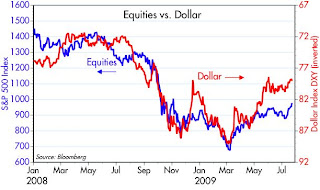 As a supply-sider, I believe a strong currency is always better than a weak currency. So how can I explain the fact that stocks are up 43% from their March lows at the same time the dollar is down 11% against other major currencies? (Note that the dollar's scale is inverted in the above chart, so a rising red line means a falling dollar.)
As a supply-sider, I believe a strong currency is always better than a weak currency. So how can I explain the fact that stocks are up 43% from their March lows at the same time the dollar is down 11% against other major currencies? (Note that the dollar's scale is inverted in the above chart, so a rising red line means a falling dollar.)The reasoning goes back to a post I made last week, in which I discussed the changes in the demand for dollar currency. The value of the dollar has been a good proxy for the world's demand for safety and a good proxy for the velocity of money. As panic set in late last summer, people all over the world flocked to the dollar as a safe haven. People stopped spending money, stockpiling it in the form of currency and in the form of higher money balances. The economy and the stock market sank as demand collapsed. It all reached a head in early March of this year, as fear of massive deficits and massive tax increases paralyzed financial markets.
Since that time, everything has reversed. The economy avoided the catastrophe many had feared, and Obama's legislative agenda has stalled and his approval ratings have plunged. People have stopped accumulating dollar currency and money deposits, and so spending is starting to ramp up. The economy is starting to come back to life.
The stock market is very sensitive to changes of this sort. The risk of massive tax increases in the future has gone down. Instead of collapsing into a depression, the economy may be managing to grow a bit. On the margin, these are huge changes, and easily capable of driving a major equity rally.
Now, I continue to believe that a weaker dollar is not a good thing. If the Fed fails to execute its exit strategy in a timely fashion, the dollar would likely weaken considerably from here, and that would not be a good thing because it would increase the risk of inflation and cause confidence in the dollar to fall, which in turn would be bad for investment and ultimately bad for the economy. But if a weaker dollar on the margin means that money balances are now being spent rather than accumulated, that is obviously good for the economy since it means that fear is subsiding and confidence is returning.





No comments:
Post a Comment